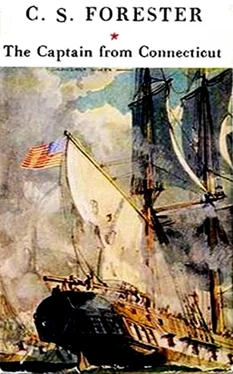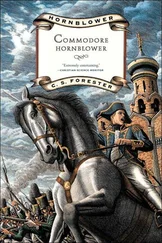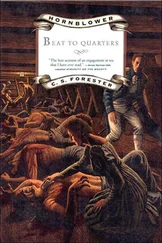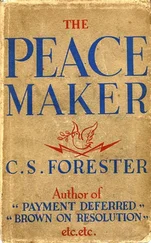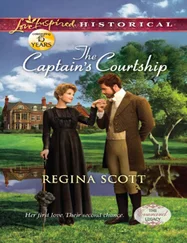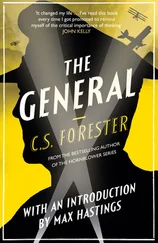Peabody nudged O’Brien, but there was no need. The Irishman’s tongue was ready enough.
“His Britannic Majesty’s frigate Calypso. Heave to!”
There was a moment’s delay, while the Delaware still fore-reached upon the brig. If the chase were American, she would open fire.
“Heave to, and wait for my boat!” hailed O’Brien.
These seconds were precious. There was no chance of escape for the brig now; in a few more seconds they could overwhelm her perhaps without firing a shot. The brig had not opened fire, and it was clear she was not American. Peabody was certain, as it was, that she was a Post Office packet; he recognised the cut of those sails. But at any second she would recognise in her turn the Delaware for what she was, by her clipper bows and raking masts and spar deck. There were no other ships at sea like the big American frigates. Peabody nudged O’Brien again.
“Heave to, damn your eyes!” yelled O’Brien into the speaking trumpet.
Five more seconds elapsed before the answer came—four bright orange flashes from the brig’s side. A ball sang over Peabody’s head, and at the same time there was a crash below as another struck home.
“Mr. Murray!” shouted Peabody, and the words had hardly left his lips before the Delaware’s broadside replied—a little ragged, but just passable. The enormous orange flames from the quarterdeck carronades left Peabody momentarily blinded. All was dark around him and he could see nothing. But overside he could hear the results of what he had done—a clatter of falling blocks and a man shrieking in agony. He had not wanted to do this; he had wanted to overwhelm the brig without effusion of blood, but once he had opened fire it was necessary to crush her before the mails could be thrown overboard.
He blinked his eyes until he could see again. The brig had come up into the wind a helpless wreck, braces and halliards shot away; the smashing broadside had almost torn her to pieces. He heard the Delaware’s guns rumble loudly as they were run out again.
“Back the mizzen tops’l, Mr. Hubbard, if you please. Brig ahoy! Have you struck?”
“Yes, God rot you,” said a voice in the darkness.
“Take the quarterboat and take possession, O’Brien. Send the captain over to me.”
“Aye aye, sir.”
The wounded man on board the brig had stopped screaming as the quarterboat dropped into the water. Peabody took a restless turn or two about the deck—the two vessels were close enough together by now for him to hear voices on board the brig, and the sound of the oars being laid down in the boat as she went alongside.
“Mr. Hubbard, take charge. I want a boatswain’s chair to hoist the brig’s captain in.”
Lights gleamed at the entry port, the sound of oars proclaimed the return of the quarterboat, and the tackles squealed as the brig’s captain was hoisted on board. Someone led him aft to where Peabody stood in the faint light of the uncovered binnacle; he was short and square and stocky, with a stiff rheumatic gait. Peabody took off his hat. “Your servant, sir.”
Truxtun in the Constellation had drilled his young officers in the manners expected of them, and Peabody’s graces dated from that time. The British captain touched his hat in the new manner of the British service.
“Perhaps you would be so good as to come below with me, sir?” asked Peabody.
Down below they were just replacing the bulkheads of the main cabin; they had a glimpse of the long gun deck where, in the dim light of the lanterns, the men were securing their guns again. Washington, the negro servant, was trying to set the cabin to rights, bustling about with chairs, lighting the big cabin lamp, putting cushions on the lockers. He was flustered by the fact that his master was receiving company in a cabin which had been cleared for action. The British captain sat down in the chair which Washington dragged forward for him, while Peabody took his seat on the starboard-side locker.
“What was your ship, sir?” asked Peabody. He knew how bitter the use of that word ‘was’ would be for his prisoner but there was no way round the difficulty.
“Brig Princess Augusta, seven days out from Kingston. My name’s Stanton.”
“Post Office packet, Captain Stanton?”
“Yes.”
“Whither bound?”
“Halifax.”
Letters for the British troops in Canada, then. The capture was doubly important.
“And what ship is this?” asked the British captain in his turn.
“United States ship Delaware.”
There was no need to say whence or whither—this prisoner might be recaptured.
“I didn’t guess you were a Yankee until it was too late,” said the British captain bitterly. “There aren’t so many Yankee frigates at sea nowadays.”
The Delaware was the only one, as far as Peabody knew, unless Decatur had managed to escape from New London.
“I hope my broadside did not do too much damage,” said Peabody.
“Four killed and seven wounded—two of ’em mortal, I think.”
Washington came back into the cabin and spread a cloth on the table. He had brought an appetising-looking tray, but the British captain waved away the food which Peabody offered.
“No, thank you,” he said. “I’ve no appetite for food.”
“I shall send my surgeon on board the Princess Augusta,” said Peabody. “I hope he will be able to relieve the wounded.”
“Thank you, sir,” said the captain.
There came a knock at the cabin door, and Washington opened it.
“It’s Mistah O’Brien, sir.”
“Tell him to come in.”
O’Brien was carrying two small but heavy leather bags, on the fastenings of which dangled leaden seals.
“I brought these over myself, sir. I didn’t want to trust ’em to anyone else.”
The bags as he set them on the deck gave out the clink of gold; Peabody glanced at the British captain and saw the look of mortification which passed over his face. But now that the discovery had been made the captain took it with the best grace he could.
“Two thousand guineas,” he said. “I was hoping you wouldn’t find it before we were retaken.”
“That’s pay for the British Army in Canada,” said Peabody. “You were quite right to bring it to me, O’Brien. Are the mail bags still on board?”
“Yes, sir.”
Stanton’s hint about the chance of the Princess Augusta being retaken no more than echoed what was already in Peabody’s mind. It was hard for the United States Navy to take prizes, but it was harder still to profit by them. The rigid blockade off every American port made it extraordinarily difficult to send in captured ships. Peabody’s instructions from the Secretary of the Navy, locked in the desk at his elbow, expressly authorised him to destroy prizes—even neutral vessels with contraband—at his discretion. The gold would be far safer on board the Delaware than in charge of a prize crew. But the mails were a different matter. At Washington they might be able to extract valuable information from them. It was worth while trying to send the brig in with the mail bags, even though it meant exposing a prize crew to the risk of capture. He sent O’Brien away with instructions before he turned back to Captain Stanton.
“If you will give me your parole on behalf of yourself and your crew,” he said, “not to attempt escape before you reach an American port, it will make your voyage far more comfortable.”
Stanton shook his head.
“You know as well as I do that I can’t do that, sir,” he said.
“More’s the pity,” said Peabody. Stanton and his men would be left battened down below, at that rate, until the Princess Augusta reached Charleston. “You are sure you will have no refreshment before you leave, sir?”
Читать дальше
